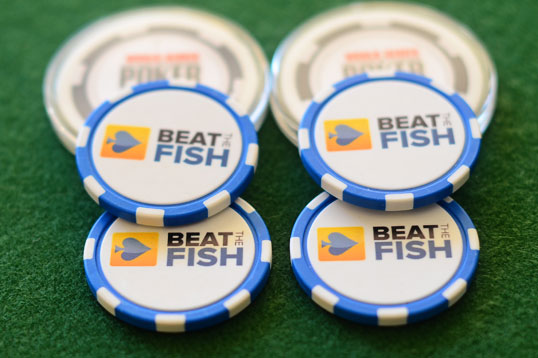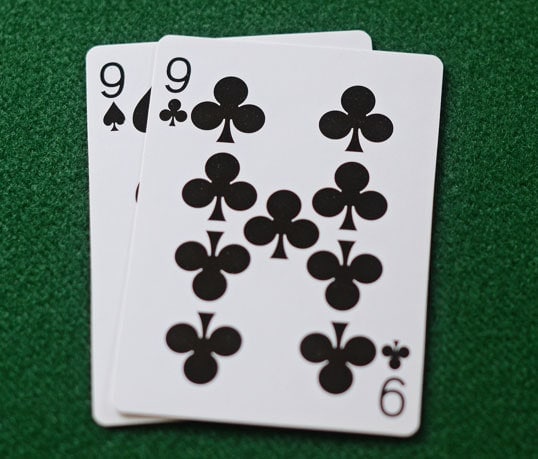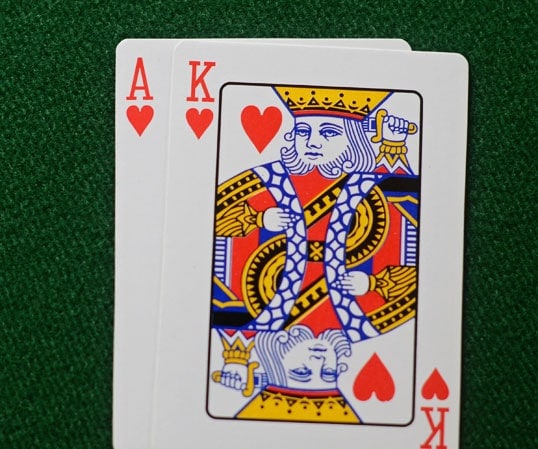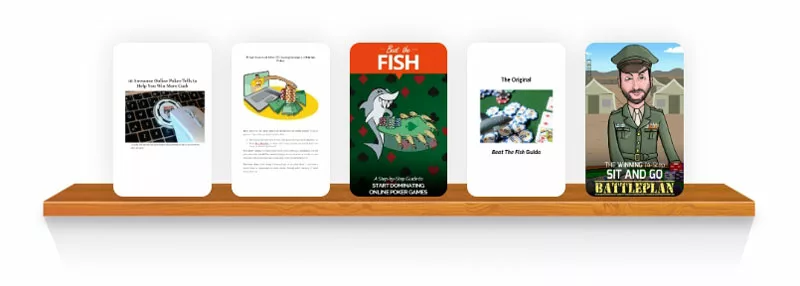If you’ve had the chance to read the other poker tournament test in this section you’ve had a solid introduction to some of the things you need to now to be a good tournament player.
Now let’s test your knowledge about the best way to play specific tournament hands.
Advanced tournament poker test answers in text format
Advanced tournament poker test questions and answers
Question 1
You’re playing the very first hand of the World Series of Poker Main Event and an early position player moves all-in. You check your hand and uncover pocket Queens.
What do you do?
Poker Tournament Quiz Answer 1
One of the big things that separate professional tournament players from amateurs is the pros get their money in as a clear favorite more often than the amateurs.
They still end up facing the same chances of losing on close decisions as everyone else, but they avoid coin flips as often as possible. In this case it’s likely the player who moved all in has a pair of Aces or Kings, in which case you’re dominated.
Even if they only have Ace-King it’s a coin flip. It’s not worth taking the risk at this point of the tournament so you should fold.
Question 2
In an online Sit and Go tournament that pays the final three players, you have pocket Eights from under the gun and three other players remain. You have 2,500 in chips, which is the average stack size, and the blinds are 100 / 200. You’ve been playing a tight game so far.
What should you do?
Answer 2
A pair of Eights has a good chance to be the best hand with three opponents and if the player to your left folds you’ll be in the best position for the rest of the hand, but it also has some issues.
If you get called your opponent will likely either have a better pair or two overcards. I recommend a raise in this situation and if you get re-raised you should fold. If you get called and you don’t hit a set on the flop you should get out of the hand without spending more money, but you might get to see the turn for free.
Your tight play is likely to pick the pot up without a fight, and it’s a fairly clear sign an opponent has a strong hand if they call or raise. A raise to 750 leaves you plenty of chips if you have to fold to remain a force in the tournament.
If you move all-in the only hands that will call you either dominate you or are a tossup. I’ll admit this is a case where there might not be a single 100% correct answer, but I’ll always either raise or fold in this situation.
I explained why an all-in move is incorrect, and a limp is almost giving your money away. You have to fold to a raise when you limp and you’ll only hit a set roughly one in eight times if you do see the flop, so you’ll end up folding most of the time
Question 3
You’ve made it to the final table of a large online multi-table tournament with a small stack in comparison to the other eight players. You have enough chips to play for at least an hour before the blinds become a problem. First place pays $200,000 and ninth place pays $10,000.
The chip leader, who’s been playing extremely loose recently, is the first in the pot from the button and raises to three times the big blind. You have pocket Nines in the big blind and have to call 10% of your stack if you decide to call.
What should you do?
Answer 3
I would almost always at least call in this situation and I would also accept raising as correct. I would often do that myself, but would probably fold to a substantial re-raise as I would still be left with 70% or so of my chips.
If I was even more shortstacked I would be willing to go all-in here depending on what I knew about my opponent.
The question frames the raiser as playing loose and opens the pot from the button. Both of those facts should lead you to feel confident about staying in. It could be a simple blind steal attempt with only a 3x raise.
You’re out of position on the big blind, but I think folding is incorrect here.
Question 4
What if you only had to call 5% of your stack, if everything else was the same as the last question?
Answer 4
The odds of being able to double up are good when you hit a set because the chip leader will probably try to bully you and your double up will be a small percentage of their stack.
When you consider the question about where to draw the line, only you can make that decision. Some players will call 10% of their stack so wherever you decide to draw the line is fine, as long as the pot odds are favorable.
But don’t make the mistake of being in too big of a hurry. You have plenty of time.
Question 5
You’re heads-up with a single opponent on the turn and you have an open-ended straight draw and a flush draw. Your opponent just moved all-in and she has you covered. If you fold you have enough chips to compete for quite a while longer.
What should you do?
Answer 5
In order to determine the best play you need to see how many outs you have. The pot odds are a clear call, but your tournament life is on the line, so there are other things you have to consider.
You have 15 cards in the deck that make you a winner, and 31 that knock you out of the tournament. Are you willing to risk your tournament life when you’ll be knocked out two out of every three times?
This is a case of outs being more important than pot odds. You should fold and wait until you’re a favorite to win.
Question 6
You’re in the middle levels of a large multi-table tournament and are starting to get short stacked. You know you’ll need to make a move to try to double up soon. The blinds are 100/200 and your stack is 1200. An early position player with more chips than you raises to 900 and you have pocket Twos in late position.
What should you do?
Answer 6
If you call or move all-in and get called, what hand do you hope your opponent holds? I can’t think of a single hand that makes me happy, so this is a folding situation. If you make a play with a small pocket pair you must be the aggressor, not the caller.
I wouldn’t necessarily be opposed to getting all-in with this, but you’re looking at a coin-flip situation against overcards at best.
With only 6 big blinds left you’ll have to make a move and this may be the best hand you’ll see, but you’ll probably want to be the one making the move rather than responding to a raiser.
When you make a move you can win if your opponents fold, but if you call you can only win with the best hand at the showdown.
Question 7
If you’re in the same situation as the last hand but you have Ace-King instead of the pocket Twos, what should you do?
Answer 7
In this situation there’s no reason to call. You’re pot committed if you call so you should move all-in if you decide to play and you absolutely should decide to play this hand.
Big Slick is exactly the kind of hand you want to make your move with when shortstacked as it is arguably the third-best tournament hand in Texas Hold’em short of pocket Kings and Aces.
You’re a big favorite against a weaker Ace and still a decent favorite against undercards.
It’s essentially a coin-flip against an underpair, but with only 6 big blinds to play with this is likely to be the best hand you’ll see before being blinded out.
Live or die with it.
Question 8
What if you’re in the same situation as far as stack size and blinds as the last two questions, but you’re the first to act with a pair of Twos?
Answer 8
You have to either move all-in or fold.
The reason you might move all-in is the same as explained above about being the aggressor. I still recommend a fold here because every time you get called you’re either dominated or in a coin flip.
Wait for a better hand to make a move.
Question 9
How do you play the same situation as the last question if you have Ace-King?
Answer 9
In this situation I recommend moving all-in. The only hands you’re scared of are pocket Aces and pocket Kings and sometimes you’ll get called with much weaker hands. You’ll win some pots and pick up another set of blinds when everyone folds.
Poker Test Question 10
Finally, how do you play pocket Aces or Kings from early position in the short stack example used in the last two hands?
Answer 10
Most players instantly say they should move all-in. This isn’t necessarily the wrong play, but should you consider limping? The answer depends on how aggressive the table has been.
If you’re relatively sure someone will raise behind you a limp is acceptable. With pocket Kings or Aces you don’t just want to win the blinds. You want to get all-in against one or two opponents if possible. Sometimes this is best accomplished by moving all-in and sometimes it’s accomplished by limping.
No matter what happens you’re committed to the hand, so even if you limp and all three opponents call you probably need to push on the flop. For these reasons, limping may be the best play, but you have to learn about your opponents as you play so you can make the best decision.












Just as an update I did fix a few correct answers and explanations to more accurately reflect what I would do in those scenarios.
Are you kidding with this test? If I had 6 big blinds mid way through a tournament I’m never folding AK. It’s always an all in situation, it’s very unlikely that you are dominated and you’re either ahead or flipping against everything else. Also folding 99 to a button raise but an aggressive player when you have 20 big blinds behind is just bad play. if you’re going to fold your way to aces you might as well just give up.
I actually collaborated on this with a strategy writer, and it looks like I didn’t look closely enough at his answers.
Absolutely valid criticisms and I agree with you 100%. Awful play to fold A-K with 6 big blinds? Awful.
A-K is probably the 3rd-most powerful tournament hand in Texas Hold’em. I’m going all-in with a lot more big blinds than that every time unless it’s very early still in a tourney.
I’m going to be correcting these later today. Appreciate the heads-up.